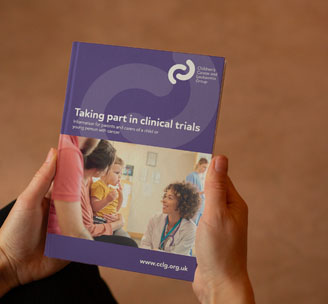Taking part in clinical trials
Your doctors may suggest you take part in a clinical trial.

Clinical trials are done for lots of reasons. The most common type is a treatment trial.
This may:
- test new treatments, such as new chemotherapy drugs
- look at new combinations of existing treatments
- change the way a treatment is given, to make it work better or to reduce side effects.
You will only take part in a trial if your doctors think that is the best treatment for you. Any clinical trial is strictly controlled, so you may need to visit the hospital more often.
Some trials are randomised. This means that the details of all the people taking part are fed into a computer, and the treatment is chosen at random by a computer programme. All the possible treatments are good, so you are not missing out if the computer does not choose a particular treatment for you. Trials are often randomised because if the researchers or doctors were to decide who should get which treatment, they might be influenced by what they know about their patients.
Your doctors won’t put any pressure on you to join a clinical trial, and they will talk to you about any concerns you have.
You can’t be put into a trial without your written consent if you are aged over 16, or your parent or guardian’s consent if you are under 16. If you decide to say no to a trial it is not a problem, and you will be given the best treatment available at the time.
What is a clinical trial?
A clinical trial is a research study to find the most effective treatment for a particular disease. Before a new treatment is available to all patients, it must be tested to be sure it is safe and effective. This is done through clinical trials.
Can everyone take part?
Not everyone can take part in a clinical trial. Each trial will have specific rules about who can take part such as type of cancer and age. These will always be discussed with you.
How does it work?
Once you or your parents have given consent, your doctor or research nurse will register you on the trial. If a trial is randomised, a computer will assign you the treatment you will be given – either the new treatment or the best treatment which is currently available. This makes sure that there is an even split of patients across the trial so that an accurate comparison can be made. It also means that each patient has a fair and equal chance of being allocated either treatment.
What are the different types of trial?
There are three different kinds of trials (known as ‘phases’) and each phase finds out something different about any new treatment.
Phase I trials test new treatments which have not been tested before in children and young adults with cancer. They help us to find the correct doses of new drugs and any possible side effects. These trials only happen in a small number of patients, usually in patients who have had all available standard treatment.
Phase II trials try to find out if the new treatment is effective at the dose(s) chosen in Phase I. They aim to find out how well the new treatment works for particular types of cancer and to highlight any side effects.
Phase III trials compare the new treatment to the best existing treatment. These involve a larger number of patients who receive either the new treatment or the current standard treatment to see which one works better. The key question asked is: ‘Is this new treatment better than what is currently being used?’
Some clinical trials can also focus on improving other aspects of your care such as trials of drugs to help you stop being sick, complementary therapies or ways of supporting you emotionally.
What happens during the trial?
If you agree to take part in a trial, your medical notes, tests and scans will be reviewed by your medical team to ensure you are eligible. Once you have signed a consent form, you will be registered onto the trial and allocated to a treatment plan. You will be asked to attend all of your scheduled clinic appointments, but you will also meet your research team who will need to know the following information:
- any medication you are taking, including prescribed medication, over the counter medication and herbal medications/remedies;
- any symptoms, side effects or complaints you are currently experiencing;
- any hospital admissions whilst you are on trial treatment.
Other things you may be asked to do include:
- Completing questionnaires
These are important because they will tell us more about how the treatment is making you feel and how it is affecting other parts of your life. - Providing extra samples of blood or urine
Where possible, these will be taken at the same time that you have your routine procedures and blood tests. If additional procedures or visits to hospital are needed, this will always be explained to you before you decide whether to take part in a trial.
It is important that this is not the main reason for deciding whether or not to take part. You can discuss with your research team a way in which treatments can be combined or if there is any financial/transport support to help you attend these visits.
Taking part in a trial may last until the treatment ends, but often the trial will also include a follow-up period, so the research team will continue to record information relating to you and your treatment. This will usually be at routine clinic appointments but sometimes you may be asked to visit the hospital specifically to provide this information. This will be explained to you before you agree to take part. Again, do not let this put you off taking part in a trial, your research team will be able to talk though possible options to make sure this is not a burden to you.
You will meet your research team regularly during your time on trial. The results of your tests will be held in your medical notes as well as information about your treatment and any side effects you experience. This information will be inputted into the trials database by the research team. Data about you will always be anonymised when it is submitted to the trials database unless you are told otherwise.
What happens at the end of the trial?
All of the results from every patient who participated in the trial will be analysed. This information will show whether or not the new treatment is better. If it is, it will be approved for general use and will become the new standard treatment for future patients.
Is it safe?
The safety of patients involved is paramount and there are laws that govern how clinical trials are conducted. Any unexpected side effects in patients while they are on a trial are promptly reported and it is very rare that a trial is discontinued. If new information about your treatment or condition becomes available whilst you are on a clinical trial, this will always be discussed with you. Your safety is your research and clinical team’s priority.
It is very important that you tell your research team about any problems you experience whilst you are on a trial so that they can help to resolve these as quickly as possible, and inform the central trials office when necessary.

Further information
CCLG has produced a booklet with more information about clinical trials. It is written for parents of a child with cancer, but the information will be relevant for you too.
